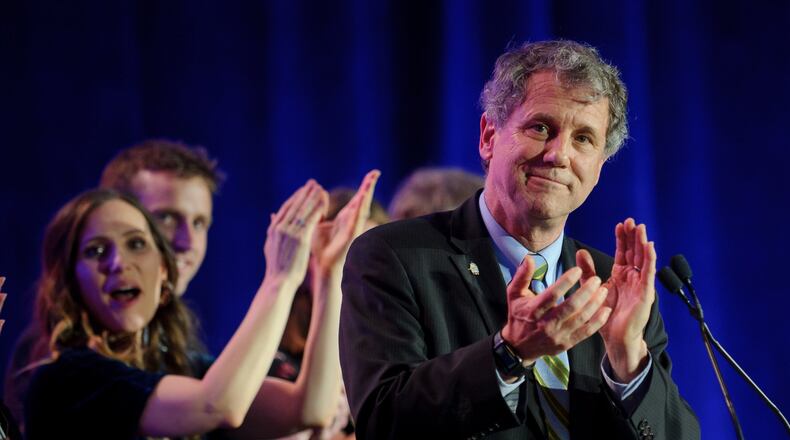Brown’s staff is seeking to arrange time for him to visit with Obama, as several potential 2020 hopefuls have done in the past year, Politico reported this week.
Brown, fresh off his election triumph in November, is riding a wave of national attention. The New York Times and the New Yorker have written glowing profiles — both, unsurprisingly, including the word “rumpled”; the magazine “The Week” called him “the Democrats’ best shot in 2020”; and two Ohio Democrats, including Dayton Mayor Nan Whaley, have launched a “Draft Sherrod” movement, complete with a website.
Even conservative columnist George Will has written a column saying Brown might be the “optimum challenger” for President Donald Trump.
Brown has no formal exploratory committee. He hasn’t been to Iowa or New Hampshire, at least not for presidential campaigning purposes. But he is the subject of so much speculation about a possible run for president that when he got a haircut, Cleveland.com posted a lengthy interview with his barber.
Amid all that talk is a central reality: Brown still is getting known nationally. A Quinnipiac University poll of potential 2020 Democratic contenders found that 77 percent of those surveyed didn’t know enough about the Democratic senator to form an opinion about him.
“I’m surprised it’s only 77,” Brown quipped.
This is all new to Brown. Although he made a list of potential running mates considered by Hillary Clinton in 2016, Brown said he’s never really thought about running for president before this year. Then the November election happened, which served notice that Brown could be a force on the national stage.
In a state that Trump won just two years ago by more than eight percentage points, Brown was the lone bright spot for Democrats. With a well-financed campaign that flooded the airwaves with ads focusing on the working class and the “dignity of work,” Brown won by more than six percentage points — a 14-point turnaround from Trump’s margin of victory over Clinton. And while Republicans won every non-judicial statewide race, Brown received more votes than any other candidate, Democrat or Republican.
Part of Brown’s appeal is he’s not a typical politician, said David Cohen, a political science professor at the University of Akron.
“People in Ohio like his frankness,” he said. “He’s utterly genuine and people long for that — somebody who doesn’t poll- test answers to questions before he gives them.
“He’s somebody that has never openly opined for the (presidency),” Cohen said. “He is somebody that clearly enjoys his job as a U.S. senator. He has never been viewed as somebody using the Senate as a stepping stone to the Oval Office.”
As 2020 nears, some voters may also see Brown’s experience as a welcome change from Trump, whose lack of political experience has occasionally spurred controversy, Cohen said. Brown is entering his 13th year in the U.S. Senate after serving 14 years as a U.S. congressman, nine years as the Ohio Secretary of State and eight years as a state representative.
Whaley, the co–chair of the “Draft Sherrod Brown” committee, said many Democrats see Brown’s honesty and everyman appeal as a key to winning back the industrial Midwest.
“He’s the poster child for being able to win the general election because of that,” she said.
Republicans aren’t quite so laudatory toward Brown. Ohio Republican Party Chairman Jane Timken said Brown’s focus on the middle class didn’t get him to back the tax bill Republicans passed last year. And his vocal opposition of Wall Street, she said, didn’t keep him from taking Wall Street donations.
“While dipping his toes in the presidential waters, Sherrod Brown has made talking about workers his central theme, but if you look back on his decades old career, that’s all he’s done — talk,” she said.
Republican political strategist Corry Bliss said resumes aren’t voters’ primary concern when they go to the polls.
“It’s all about charisma and excitement and firing up people and motivating people,” he said. “It’s not who has the best 27-point plan for the economy. It’s who has excitement and charisma. It’s the ‘it’ factor.”
And when it comes to the it factor, according to Bliss, Brown “has the charisma of watching paint dry.
“It’s hard to imagine how or why he’d stand out,” he said.
About the Author
